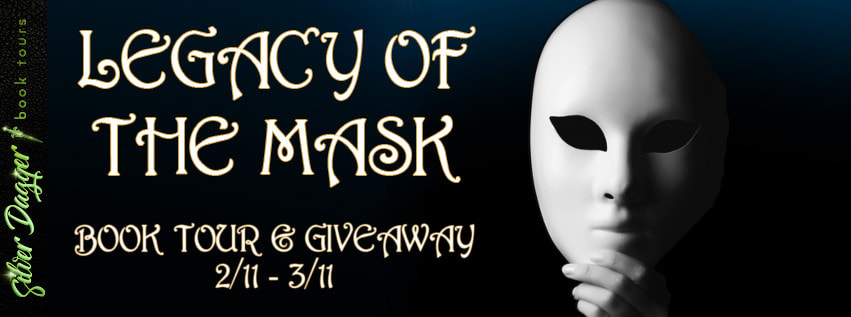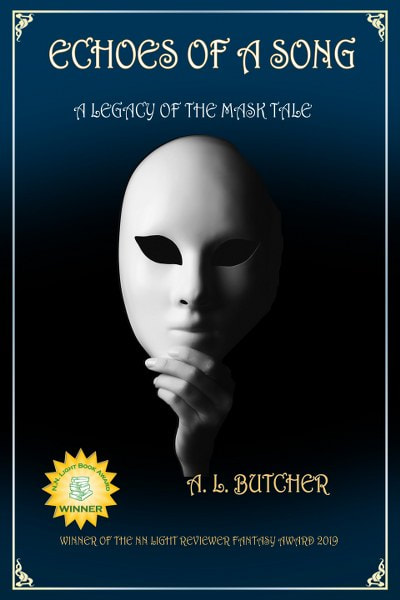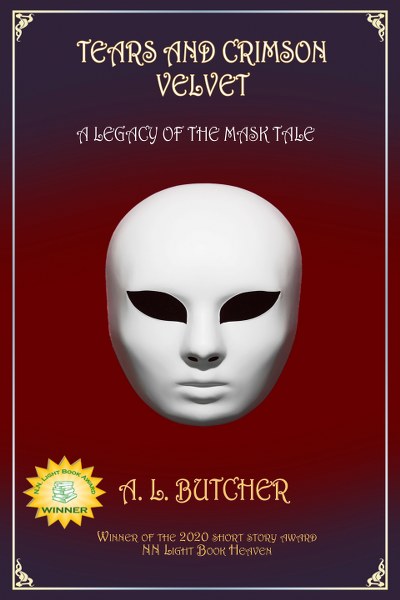Tears and Crimson Velvet - Excerpt
© A. L. Butcher
Part 1 – The Palais Garnier -1890s
Madame Lise Giry unlaced her shabby black boots and
stretched her aching feet onto a threadbare footstool. Her room was cold, the
stone walls leeched heat and the hangings did not compensate much. Lise felt
cold within – this was the cold of deadly knowledge and sadness. It ate at the
soul, and the heart but Lise remained within
these walls. She had a duty to do so, but it was not so simple. She had a
promise to keep.
The last opera of the season was always the most
exhausting; so many expectations, trepidations and often mistakes. Already
highly-strung artistes were at breaking
point. Even the soloists were not on top form, with Babette tripping during her
dance and her partner straining a muscle trying to compensate. The corps de
ballet was flighty and nervous, and Lise
couldn’t blame them for that. Recent events had brought kidnap, murder and
extortion. Lise thought it was like a gothic novel
or one of the increasingly popular crime fictions. Yet this was dreadfully
real. Terrifying. Tragic. Shaking her grey tinged head Lise let a tear fall now
she was alone. She hoped next season would be more settled, at least as far as
such things could be in the volatile world of theatre, with its gossip, its
affairs, and its micro-world where only those within really understood. Sometimes
she’d pondered on retiring and having a ‘normal’ life- whatever that might be,
but deep down Lise knew this life and more importantly,
this place was in her blood and soul. And
there was her gentleman….
“It’s certainly been a more eventful season than
usual,” she muttered to the reflection in the looking glass of her room. Madam
Giry should not, perhaps, have had this room with its ebony wood and faded
silken chaise; the artwork, elderly and rather faded as it was, and the mirror.
Yes, the mirror! Rumours abounded about
haunted mirrors, and some said they captured the soul. Lise could believe that
from all that had happened these last few months. In the charged corridors of
the Opera House, it was said Christine’s
mirror sang and she had once disappeared through it to a beautiful subterranean palace. Dancers and theatre folk
held many superstitions and strange beliefs, but not all were simply foolish
tales. Even myth can have a basis in fact.
Lise wiped her eyes. Tragedy walked the passages
and stairways of the Opera House. The Angel of Death dwelled here. Lise herself was not a superstitious
woman; she’d seen enough to warrant a belief in ghosts, strange goings-on and
mystery but knew most often there was a rational explanation. Most often but
not always. She’d been raised a Catholic,
but these days no answer came from above or her Bible. Once she’d been told there was no
redemption. The rosary now hung on a nail behind her favourite chair,
but faith is often tested. Lise had met an angel – she was sure of it but if
anything, that had rocked her faith more than anything else. Angels could be
damned – of that she was certain. And the angel had a name.
“Poor Erik.” The sound rose in her throat before
she even realised. But it was ritual now – she spoke those words every night.
Lise did not recall when those two words had replaced her nightly prayer, but
they had and now she seldom bothered God.
Lise rose and felt around in the drawer of the old wooden cabinet. The note was faded, brown
and barely readable but she knew each word.
A token of regard and thanks for what you have
done. The Opera House requires a seamstress. Your application will be accepted.
A friend.
Any sensible person would have questioned such a
mysterious offer, and Lise did but desperation and curiosity got the better of caution and she duly presented herself
at L’Opera De Paris. The interview with M. Debiene
had been strange, in hindsight. He’d been rather nervous and looked around him
as though expecting someone to appear. No one else had joined them. No one else
obvious Lise had later realised. And so she had become a seamstress and assistant chaperone. The
previous incumbent had walked out, refusing to ‘work in such ungodly
conditions’, and the junior seamstress had fled the following night, crying
about a face in the wall. All this Lise
found out quickly after she had accepted the position. Lise was desperate
enough to put fear aside and so she kept herself to herself as much as her
position allowed. There was no cause for reprimand, and Lise worked hard and
seldom complained. It was not easy, but she’d learned, life seldom was. The
salary was fair but not generous, but debts needed to be paid, and so
extravagance was beyond the widow’s reach.
In the years which passed,
she saw or thought she saw him, the Opera
Ghost, as she went about her business. A voice echoed in her head, and a song
ached her heart raw, but she could not bring herself to leave, as many others
had. That song she’d heard before and found she needed it. That voice had
filled her dreams. It was like a narcotic, - enchanting, addictive and
potentially deadly. More than once Lise questioned what she’d seen and heard,
and the gossip which filled the dressing rooms, the flies and understage.
Madam Giry had found the answer when she’d ventured deep in the bowels of Garnier’s masterpiece –
the Opera House - for costumes unused for many years. Beyond substage was a
lake, for the cellars went deep below the streets and pumping the water out was
costly. On that day Lise had heard the song and been drawn down deeper than
she’d ever been, deeper than most here knew existed. Then she’d seen him again,
the pale, gaunt figure with the angel’s voice, the devil’s face and the tragic
soul. That had been her answer and her curse. she knew the truth hiding
beyond the lie. In those days truth wore a mask.
The man had stopped, for the ghost
was a man, and looked at her with eyes that burned with a deep sadness in the
pale mask which covered his ravaged face. Courage and remembrance had loosened
her tongue and in that trembling darkness she’d simply said, “Erik.”
“Lise Giry. I trust you are
enjoying your new role in my opera house.” His voice was soft, yet powerful; a
voice which could and did ensnare souls. Yet here he was gentle but sure of
himself and, it seemed, the master of this domain. His words were a statement
not a question and his amber eyes burned into her soul.
“So it’s you?” She swept her hand
upwards. “All this?”
“If I cannot be a man of flesh I
will be a ghost. Even I cannot live entirely in seclusion.”
His eyes burned in the light of
the lantern, full of hate, of resignation, full of sadness. Lise shivered, he
was intense, like an animal about to strike.
“You might be surprised,” she
replied, although knew neither of them would believe it.
“Fear is a powerful tool, that I
know more than anything. Maybe even more powerful than love, and more enduring.
If I cannot have one I can own the other. Now I command the fear and am no longer its creature. I shall rule this
place with rumour and superstition and if I cannot be loved then I will be
feared. Oderint dum metuant, said
Atreus, and he was correct.”
Slowly she looked around, her
lamplight glittered on the black water, like jewels on velvet. Lise tried to
assess him –a head taller than her and shrouded in darkness. He kept to the
edge of the circle of light. Erik moved like a cat, silent and deadly and she
knew that thin frame held a strength and purpose which was unwaning. And Lise
shivered. “You are not that person, you have good in you. I have seen it.” Her
voice trembled and his laugh filled her with terror.
“I know what I am, madam. I know
what the world has made me, let it rue its creation. But I am keeping you from
your business.” Erik turned away from her and continued quietly, “What you seek
is in the storeroom above this staircase. Do not come this far again, for it is
guarded by a siren. Keep to the upper levels and you’ll be safe enough. Keep my
secrets and you’ll never be hungry again. I repay my debts.”
So on that afternoon in the subterranean catacombs of the mighty Opera House the widow nodded,
held out a hand in friendship and the Opera Ghost bowed his head then was gone.
Her heart pounded, and her soul rejoiced, then plunged into despair. There had been murders, apparently
suicides and the cursed operas. It was, so one of the managers said, good for
business. The public liked gossip and
there was gossip aplenty, but his co-manager, M. Debiene held the view they would be ruined. Lise held her opinions
to herself.
Lise knew she should have reported what she had
discovered but she could not, would not. This man had been caged once before
and that sight had haunted Lise for many years. She’d promised never to let him
be caged again. Even so many years later when the bodies began to pile up Madam
Giry held her tongue. She told herself it was through fear, but deep within
knew that was not entirely true. She was afraid, but for herself as well as
Erik. His voice held her captive, as it would many others, but she had seen his
soul and could not endure the thought of it being captured again. Some souls
were wild and free, the morals and laws of men failed to tame them; such souls
were fearsome and beautiful, and to cage them was a crime beyond any other.
Shortly after that particular encounter, Lise had been promoted to box
keeper, specifically for Box Five – the Ghost’s box - and her salary increased,
and a small dressing room and chamber put aside for her use should she wish it.
It was a step up from her former life, not wealthy but certainly more
comfortable. Erik was true to his word – her belly was never empty, and
although her salary was not large she was not hungry or as desperate as once
she had been. Her step-children had ensured she received nothing from the early
death of her husband save a few trinkets and her daughter Meg, a child barely
acknowledge by her siblings. Her stepson had even voiced suspicions about the
captain’s death, for he’d been a hearty man and his demise had been swift and
unexpected. Lise had nothing to hide, but the gendarmes asked awkward
questions, and young M.Giry held some influence and so reluctantly Lise had
packed what little she’d been allowed and left. But debts had a way of
following and growing.
Lise knew other woman, widows and ex-mistresses
often fell to earning their keep in more physical ways. Paris was rife with
prostitutes of all kinds and in years past Lise had almost been desperate
enough to join their ranks to feed herself; she’d survived those dark years by
taking in sewing, washing, and mending, selling paper flowers and making lace. Her life was not what she’d imagined it
would be, she had hoped to make a happy marriage, continue her husband’s line
and live content and cherished. Lise’s mother had said she had a hopelessly romantic
soul. It was true, Lise reflected. Then
there was him. The angel, the ghost. She would not betray him. Could not.
Six Questions with…
Name: A L Butcher
What
attracts you to the genre in which you write?
Predominantly
I write fantasy, it’s a genre I enjoy reading. Anything is possible in fantasy
– magic, monsters, strange new worlds. I guess you could say that fantasy is
the ultimate escapism. I love mythology too – I have a background in Classical
Studies, and I’ve loved the Ancient Greek and Roman tales for years. Mythology
is at the heart of many cultures – from the Graeco-Romano and Norse basis of
European culture, to Japanese, Indian, Chinese and African societies. It’s at
the heart of who we are.
Historical
fantasy – now that encompasses my love of history and the mythic storytelling
of fantasy.
Occasionally
I venture into the realms of horror. I have a short story based on Jack the
Ripper – that case has fascinated me for years – who was this man (assuming it
was a man)? I also have a ghost story and a vampire story. I like gothic horror
– Dracula, Frankenstein, Phantom of the Opera. These bring the thrill of
terror, but without the in your face violence of some modern horror.
My Legacy
of the Mask tales are based loosely on the Phantom of the Opera – a story I
have loved for 35 years. The original tale by Gaston Leroux is superb – tragic,
yet heroic, mysterious and scary in places. Leroux wrote one of the first
Locked Room Mysteries (The Mystery of the Yellow Room) and several terrifying
short stories. There are at least a couple that will have you sleeping with the
light on for a week. Phantom is a tragic story of love, despair and mystery. I
cried when I read it, I still cry when I read it, and I worked on the stage
tour for a while, and I still cried every night.
Sometimes
one finds a story that touches your soul and becomes part of who you are.
What
piece of writing advice do you wish you’d known when you started your writing
adventures?
Marketing
is hard! Being an indie author means not only do you have to hone the craft of
storytelling but you have to learn to do most of the other stuff yourself (or
find others to do so if you can afford it). Formatting, editing, cover design,
social media, marketing, and all the other things which you didn’t know about
in advance. I can write, I can edit and format and I can do a reasonable cover,
but convincing other people why they should buy my books – that bit I find a
challenge.
If
you could have dinner with any famous person or character who would you choose?
Not in any
particular order:
Gaston
Leroux
Mary
Shelley
Alexandre
Dumas
Homer
Stephen
Hawkin
David
Attenborough
JRR
Tolkien
Terry
Pratchett
William
Shakespeare
Victor
Hugo
Bram
Stoker
HG Wells
Jules
Verne
The Count
of Monte Cristo
The
Phantom of the Opera
Frodo
Baggins
Death from
the Discworld
Odysseus
Sam Vimes
Tempus
Who
has been the greatest influence on your work?
Gosh, many
people. My friend Diana, my parents, Janet Morris, my old English Teacher Miss
Krombacher, lots of authors (see above list).
Do
you think the e-book revolution will do away with print?
No, at
least I hope not. Lots of people don’t have, like or use e-readers and print
books are still popular. There is something wonderful about a physical book
that is absent with words just on a screen. E-readers are great, they can store
an entire library-worth of books, the books are generally cheaper and you can
scroll the text to the size you need. Some will read to you, which is great for
people who can’t see well. I find non-fiction harder to read on an e-reader,
especially if there are tables, illustrations etc. Reference books are far
easier in print.
I think
the e-book revolution has given authors a chance to write a far more diverse
pantheon of books, there is a lot less cost involved in an e-book and it’s
easier to format. Short stories don’t work so well in print and are more likely
to sell as single stories as an ebook.
Which
3 books would you take to a desert island and why?
Only 3?
Erm… The Count of Monte Cristo, The Phantom of the Opera, I the Sun.
Or maybe…
The War of the Worlds, Thud, The Lord of the Rings
Or The
Odyssey, Watership Down, Dracula











Comments
Post a Comment